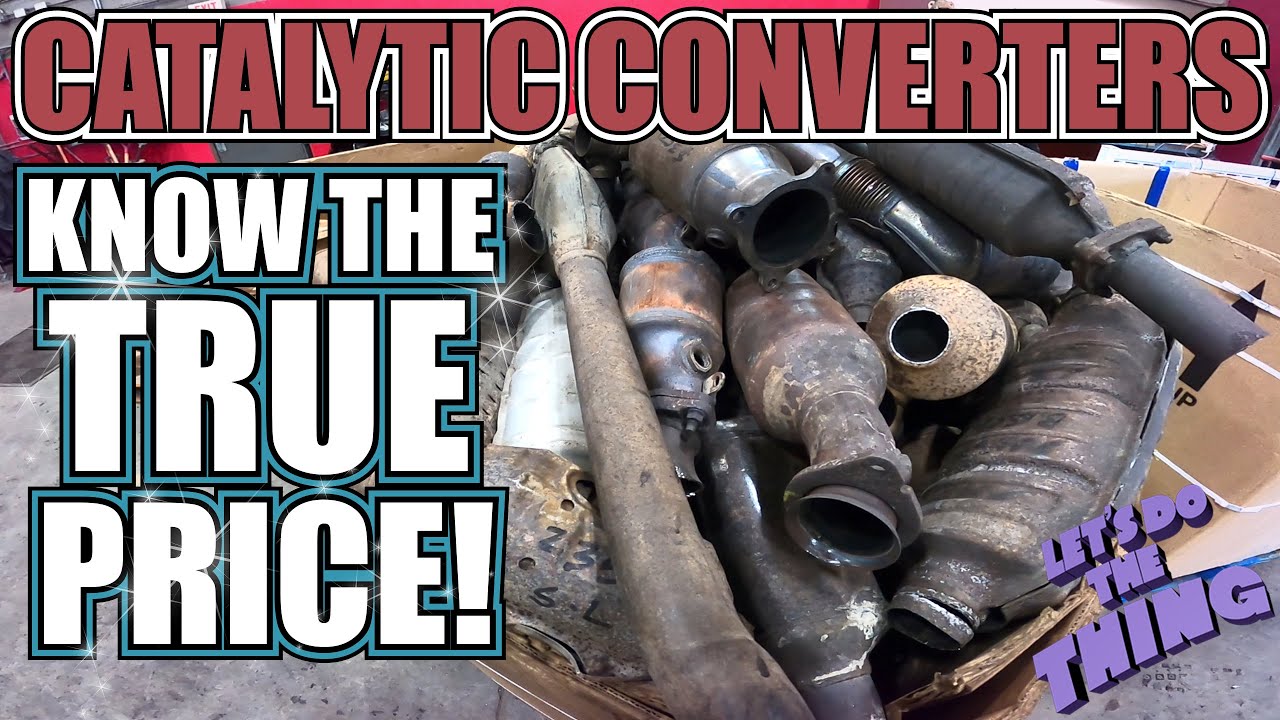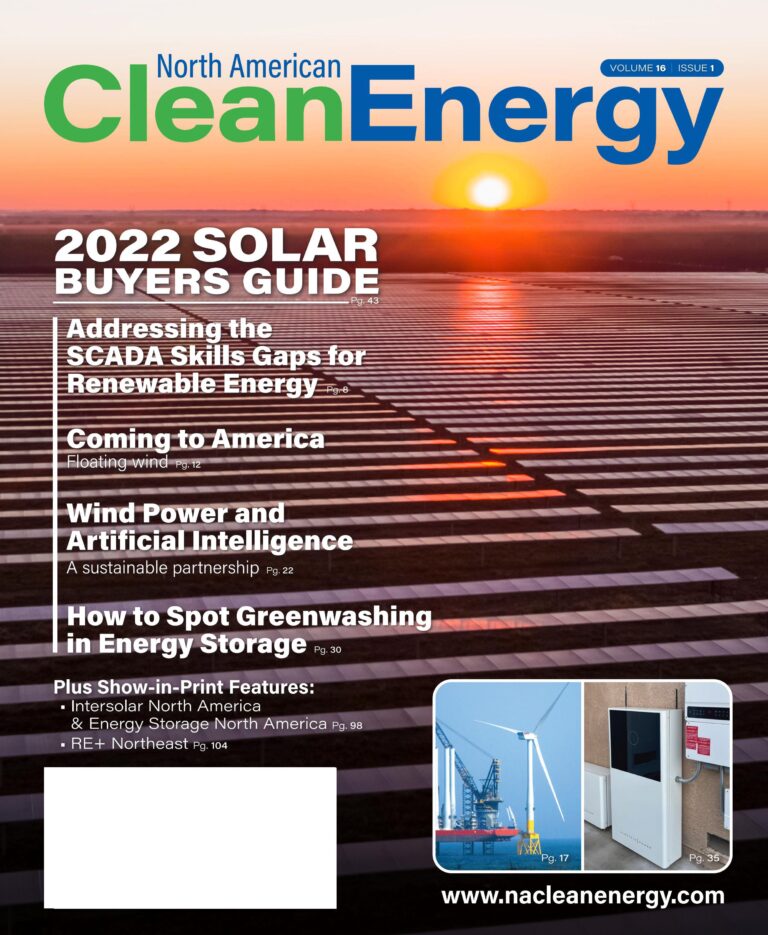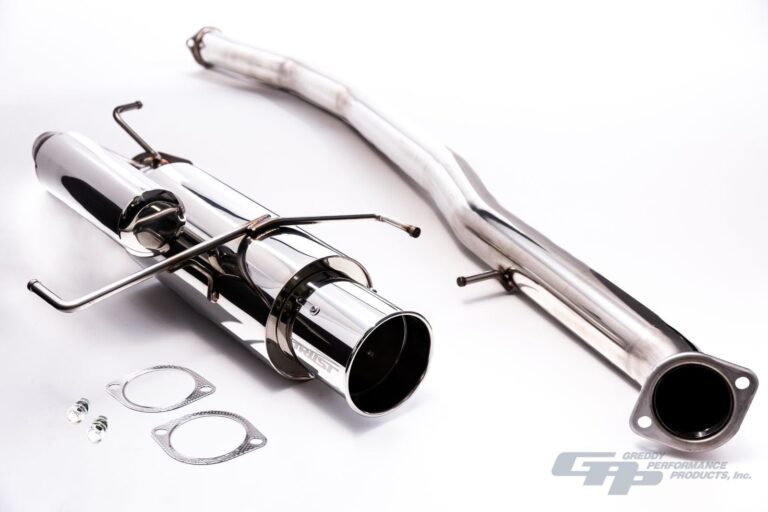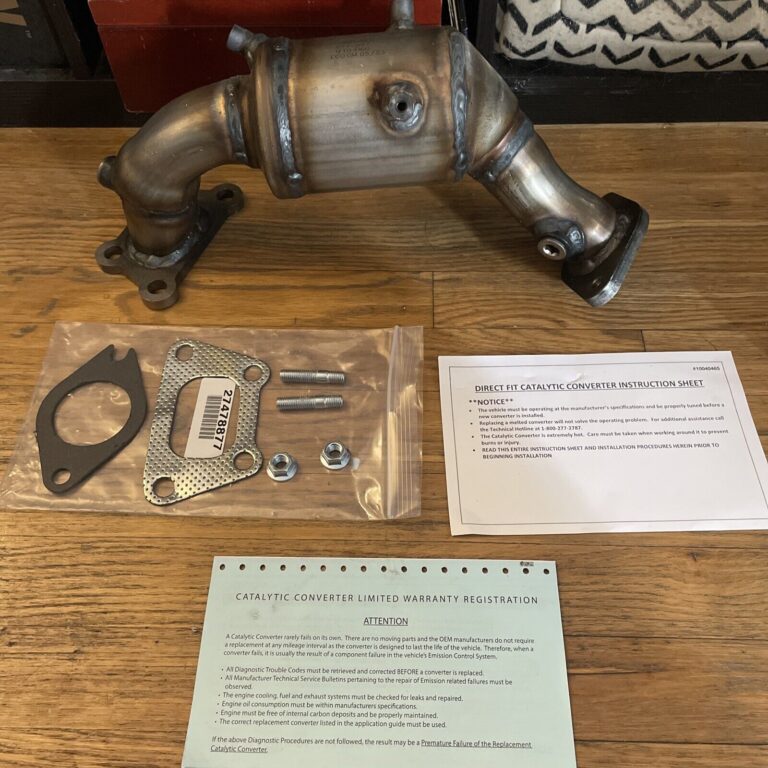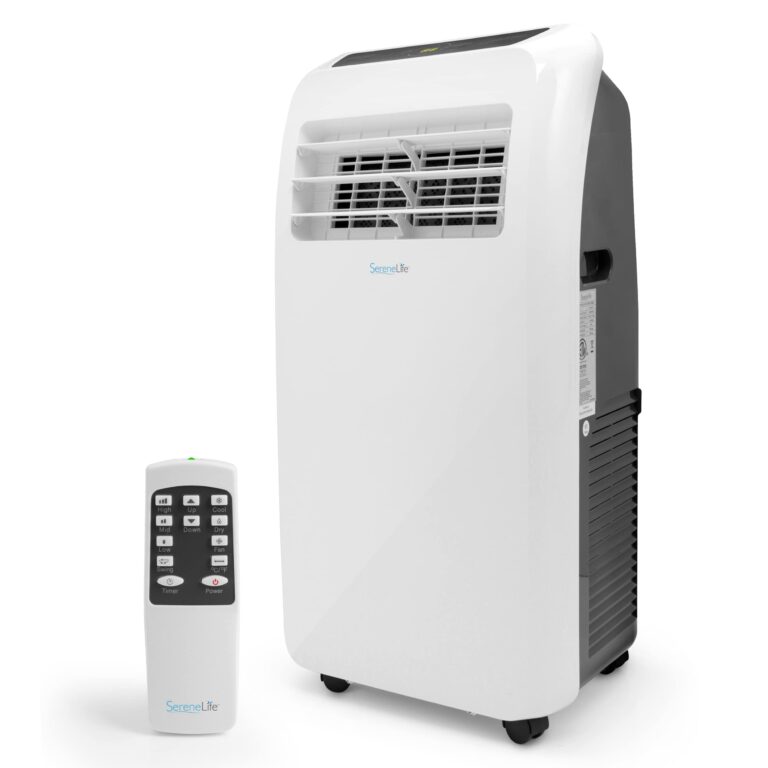How Much are Catalytic Converters: The Ultimate Guide to Pricing and Worth
Catalytic converters range in price, with average costs ranging from $100 to $1,000. Catalytic converters vary in price, depending on factors such as the vehicle make and model, the type of catalytic converter needed, and where it is purchased.
On average, a catalytic converter can cost anywhere from $100 to $1,000. It’s important to note that the actual price may be higher or lower depending on specific circumstances. Catalytic converters are essential components of a vehicle’s exhaust system, helping to reduce harmful emissions and comply with emissions regulations.
Understanding the cost associated with catalytic converters can help vehicle owners budget for potential replacements or upgrades.

Credit: recyclinginside.com
Understanding Catalytic Converters: An Overview
htmlA catalytic converter is an essential component in a vehicle’s exhaust system. It plays a crucial role in reducing harmful emissions and ensuring compliance with environmental regulations. Let’s take a closer look at catalytic converters:
What Are Catalytic Converters?
Catalytic converters are devices that are installed in the exhaust system of vehicles. They contain a catalyst, usually made of platinum, palladium, and rhodium, which helps convert harmful gases emitted by the engine into less harmful substances before they are released into the atmosphere.
How Do Catalytic Converters Work?
Catalytic converters use a combination of chemical reactions to convert harmful gases. When exhaust gases pass through the converter, the catalyst promotes oxidation and reduction reactions that convert carbon monoxide (CO) into carbon dioxide (CO2), nitrogen oxides (NOx) into nitrogen (N2) and oxygen (O2), and unburned hydrocarbons (HC) into carbon dioxide (CO2) and water (H2O).
Why Are Catalytic Converters Important In Vehicles?
Catalytic converters are crucial for reducing air pollution and meeting emission standards. They help minimize the release of harmful gases, such as carbon monoxide and nitrogen oxides, which contribute to smog, respiratory problems, and environmental damage. Without effective catalytic converters, vehicles would significantly contribute to air pollution, compromising both human health and the environment.
Factors Affecting Catalytic Converter Pricing
Factors Affecting Catalytic Converter Pricing:
When determining the cost of a catalytic converter, there are several factors that come into play. Firstly, the materials used in catalytic converters greatly influence the price. High-quality and efficient materials, such as rare metals like platinum, palladium, and rhodium, tend to be more expensive.
Vehicle make and model also plays a significant role in pricing. Some vehicles may require specific catalytic converters, which can be more costly due to their unique design and compatibility.
Moreover, emissions regulations and standards impact the pricing of catalytic converters. Stricter regulations often demand advanced converter technologies, leading to higher costs.
A reputable brand can also affect the price. Well-established brands with a strong reputation for producing reliable and efficient catalytic converters may charge a premium.
Overall, the price of catalytic converters can vary based on materials, vehicle make and model, emissions regulations, and brand reputation.
Determining The Value Of A Catalytic Converter
When determining the value of a catalytic converter, it is essential to understand the precious metals content within it. These metals, including platinum, palladium, and rhodium, contribute significantly to the converter’s overall worth. To identify and assess the presence of these precious metals, one can utilize different methods such as X-ray fluorescence (XRF) analysis or atomic absorption spectroscopy (AAS).
Once the metals are identified, evaluating their quality and quantity is crucial. This can be achieved through assessing the density, color, and condition of the converter. A higher concentration of precious metals and a well-maintained converter typically yield a higher value.
To determine the current market prices for these metals, one can refer to reputable sources like metal price indexes or online platforms that provide real-time market data. It is advisable to stay updated with the latest market trends as metal prices can fluctuate.
Common Types Of Catalytic Converter Pricing
Common Types of Catalytic Converter Pricing:
- Original Equipment Manufacturer (OEM) catalytic converters: OEM catalytic converters are designed and manufactured by the same company that produced the original converter for the vehicle. They are known for their high quality and precise fit. However, they tend to be the most expensive option in the market.
- Aftermarket catalytic converters: Aftermarket converters are produced by third-party manufacturers. They offer a wide range of options in terms of price and quality. While some aftermarket converters may match the OEM standards, others may not provide the same level of performance and durability.
- Universal fit catalytic converters: Universal fit converters are designed to fit a broad range of vehicle makes and models. They are typically the most affordable option available. However, they may require modifications or additional parts for proper installation, and their performance may not match that of OEM or aftermarket converters.
Pricing Range For Catalytic Converters
When purchasing a catalytic converter, it’s important to consider the pricing range. The cost of catalytic converters can vary depending on the type and quality you choose. Here are the different pricing ranges for catalytic converters:
| Type | Pricing Range |
|---|---|
| Entry-level catalytic converters | Budget-friendly options |
| Mid-range catalytic converters | Balancing cost and quality |
| High-performance catalytic converters | Premium options for enhanced performance |
Entry-level catalytic converters are ideal for those on a budget. These budget-friendly options provide the basic functionality required to meet emissions standards without breaking the bank.
Mid-range catalytic converters offer a balance between cost and quality. They are designed to provide adequate performance while still being affordable for most consumers.
For those seeking optimal performance, high-performance catalytic converters are the premium choice. These options are built to deliver enhanced performance, making them ideal for high-performance vehicles or enthusiasts who want the best of the best.
Remember, the pricing range of catalytic converters can vary depending on factors such as brand, material, and vehicle compatibility. It’s essential to research and compare different options to find the one that best fits your needs and budget.
Understanding The Cost Of Catalytic Converter Replacement
Understanding the cost of catalytic converter replacement involves considering various factors. One of the primary expenses is the cost of the catalytic converter itself. The price can vary depending on the make and model of your vehicle, as well as the type of catalytic converter you need (e.g., standard, OEM, performance). Additionally, labor costs for installation are another important factor to consider. Depending on the complexity of the replacement process, these costs can vary. In some cases, additional parts and components may be required, such as gaskets, bolts, or exhaust pipe sections, which can add to the overall cost. It is also worth taking warranty considerations into account, as some converters come with extended warranties that can affect the final price. To get an accurate estimate, it is recommended to consult with a reputable mechanic or exhaust specialist.
Factors Influencing Catalytic Converter Worth
One of the key factors that determine the worth of a catalytic converter is its age and condition. Older converters or ones in poor condition might not fetch as high a price as those that are relatively new or in good shape. Another factor to consider is the mileage and usage of the vehicle it was installed on. Converters from vehicles with higher mileage or heavy usage might be less valuable due to their wear and tear. Proper maintenance and care of the converter can also help preserve its worth. Regular cleaning and avoiding excessive damage can extend its lifespan and retain its value. Lastly, the market demand for catalytic converters has a significant impact on their worth. Higher demand can lead to higher prices, especially if there is a shortage of supply.
Tips For Buying Catalytic Converters
Research reputable brands and models: When looking for a catalytic converter, it is important to do your homework and research reputable brands and models. Look for reviews and feedback from other customers to ensure you are purchasing a high-quality product that will be beneficial to your vehicle.
Consult with professionals for guidance: If you are unsure about which catalytic converter to buy, it is always a good idea to consult with professionals. They can provide you with guidance and recommendations based on your specific vehicle make and model.
Consider compatibility with your vehicle: Before making a purchase, make sure the catalytic converter is compatible with your vehicle. Check the specifications and consult with experts if needed to ensure a proper fit.
Compare prices from different suppliers: One important factor to consider is price. Take the time to compare prices from different suppliers to find the best deal. However, remember to prioritize quality over cost to ensure a long-lasting and effective catalytic converter.
Selling Catalytic Converters: Best Practices
Researching scrap metal buyers and market prices is an important step when selling catalytic converters. By doing so, you can determine the current value of your converter and find trustworthy buyers who will offer a fair price. It’s also crucial to understand the local regulations and legal requirements surrounding the sale of catalytic converters. This ensures that you are complying with the law and avoiding any potential legal issues.
Preparing the catalytic converter for sale is another best practice to follow. This involves removing it safely from the vehicle and cleaning it thoroughly. A clean and well-maintained converter is more likely to fetch a higher price.
Choosing the best selling platform or method is key to maximizing your profits. You can consider selling directly to scrap metal yards, online marketplaces, or even specialized catalytic converter buyers. Each option has its own pros and cons, so make sure to choose the one that suits your needs and preferences.
Preventing Catalytic Converter Theft
Catalytic converters are valuable components of a vehicle’s exhaust system, often targeted by thieves for their precious metals. To prevent catalytic converter theft, it is important to take certain precautions:
- Park in well-lit and secure areas: Choose parking spots that are well-illuminated and highly visible to deter thieves.
- Install security measures such as alarms and cameras: Adding a security alarm or CCTV cameras to your vehicle can act as a deterrent and help catch thieves in the act.
- Engrave identification numbers on the catalytic converter: Engraving your vehicle’s identification number on the catalytic converter can make it less attractive to thieves and easier to trace.
- Consider using catalytic converter protective devices: Various protective devices such as shields, cages, or clamps are available in the market, which can make it harder for thieves to access and remove the catalytic converter.
By following these preventative measures, you can reduce the risk of catalytic converter theft and safeguard your vehicle.
Frequently Asked Questions For How Much Are Catalytic Converters
How Much Scrap Is A Catalytic Converter Worth?
A catalytic converter can be worth anywhere between $50 and $250 in scrap value. It depends on factors like the type of converter and the current prices of the precious metals inside it, like platinum and palladium.
Are Catalytic Converters Worth Replacing?
Replacing catalytic converters is worth it as they help reduce vehicle emissions and ensure compliance with environmental regulations. Besides, a faulty catalytic converter can affect engine performance, fuel efficiency, and cause potential damage. It is advisable to consult a professional to evaluate the need for replacement.
Why Is It So Expensive To Replace A Catalytic Converter?
Replacing a catalytic converter can be expensive due to the complex design and specialized materials used. Additionally, it requires skilled labor and specific equipment. The cost also includes factors like emissions regulations and the need for genuine parts.
How Much Is A Toyota Catalytic Converter Worth Scrap?
Toyota catalytic converters can be worth anywhere from $50 to $600 in scrap, depending on the model and condition. Keep in mind that the value may also vary based on the current market prices for catalytic converters.
Conclusion
Catalytic converters play a crucial role in reducing harmful emissions from vehicles. Understanding the cost of catalytic converters is essential for car owners and mechanics alike. By considering factors such as the type of vehicle, location, and quality of the converter, one can make an informed decision.
It is important to research, compare prices, and consult professionals to ensure a fair deal. Protecting the environment and complying with emission regulations should be a priority, and investing in a reliable catalytic converter is a step in the right direction.
